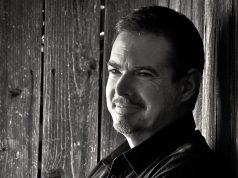
In a world that plunks authors into brushed-aside categories like science fiction, fantasy and romance, one author is tiring of the “guilty pleasure” label.
“I have a very good friend, and I’m standing in her house listening to her tell me that she doesn’t really like fantasy literature,” says Longmont author Carrie Vaughn, a “mass market” novelist with nine books on the New York Times bestseller list. Her most recent book, Dreams of the Golden Age, came out in January. “And I’m looking at her shelf, and there’s the Narnia books, and there’s Harry Potter and this and that, and it’s like, what are you calling fantasy? … There’s this thing that happens that once something gets popular enough, it’s no longer considered hardcore science fiction.
“[Having worked] in [a] bookstore, I’ve known about this for a long time. There are some books that, once they become acceptable enough to the mainstream, they are no longer shelved in the science fiction, they’re shelved in the literature section, like [George] Orwell’s 1984, Aldous Huxley’s Brave New World, [Anthony Burgess’] A Clockwork Orange.”
Vaughn points out that some of the most successful franchises — Star Wars, for example, and more recently the slew of Avengers movies that recently came out — are science fiction. Yet if you mention someone’s a science fiction fan, they’re likely to take it as an accusation rather than a statement of fact.
That said, Vaughn says she’s content to live and dwell in the world of science fiction. A lifelong fan who grew up reading Ursula Le Guin and Robin McKinley along with Arthur C. Clarke and “the master,” Ray Bradbury, she’s always found herself drawn to the world of speculative fiction. She’s best known for the Kitty Norville series, now 12 books long, a paranormal “urban fantasy” about a call-in radio advice show host, Kitty, who happens to be a werewolf. She’s written 17 books since 2004 and dozens of short stories, one of which, “Amaryllis,” received a nomination for the 2010 Hugo Award, which Vaughn calls “the Pulitzer of science fiction.”
She started out ambitious and never changed. In high school, she started submitting short stories to anthologies, and her skin grew thick after the rejection letters arrived. Rather than dissuading her, she became more set in her ways. She attended Occidental College in Los Angeles and met some resistance from the creative writing department, which was skeptical of her literary ambitions.
Instead, she studied English literature.
“The creative writing professor at Occidental College is this wonderful woman, really talented, really supportive, but she did not get science fiction at all,” Vaughn says with a smile. “I ended up not doing a whole lot of creative writing classes and degrees. … I figured, I was already writing, I didn’t need somebody to tell me how to write. I needed to study other people’s writings. I think that was more valuable.”
Still, she was in grad school at the University of Colorado Boulder study ing, again, English lit when she saw her first true success as a writer — her short story “The Haunting of Princess Elizabeth” appeared in the Sword and Sorceress anthology in 2000 (volume 17, Vaughn recalls, without missing a beat). Four years and a couple more short story successes later, she had a book deal, and, in 2005, her first book, Kitty and the Midnight Hour, was published.
Vaughn shared her thoughts with Boulder Weekly about the sometimes awkward interactions between science fiction and the mainstream, and her simple plan to keep her profession of writing fun and interesting.
Boulder Weekly: I read a science fiction blog recently that tore George Saunders’ short stories apart for not being properly science fictional.
Carrie Vaughn: That’s actually a huge source of anxiety for a lot of science fiction writers. It’s tough when you’re a longtime science fiction writer and then a mainstream literary author comes along and does something science fictional, because what usually happens is that within science fiction, that idea has probably been done. And not just been done, but done 30 years ago, by someone who was able to get a lot deeper into the idea.
You’ve written 12 books in the Kitty series. You’re not sick of her yet?
No! In fact, I keep finding more things to say. And that’s kind of been the key for me, that I have something interesting to say with every book and that I’m not telling the same story over and over again. But in the meantime, I’ve gotten to do other things as well. Having success in that series has given me a platform that I can go off and do other things. I’m still writing a bunch of short stories. I got nominated for a Hugo award a couple years ago, which was a really big deal for me. Having grown up in science fiction, the Hugo is the Pulitzer of science fiction, so that was a really cool thing to get nominated for. I’ve written other books — my superhero novels, I’ve done some young adult fantasy. That’s kind of my plan from here on out, to just kind of keep doing what I want to do and convince other people to read it and publish it. So far, so good.
It’s very simple when you put it that way.
It turns out it is pretty simple; it just takes a heck of a lot of hard work and sticking with it. I see too many people who give up, because it is hard, it’s really hard, and it’s really hard because you have to keep doing the same thing over and over again, beating your head against the same walls.
But … I write what I want to write. I left my first publisher because they wanted me to stick to Kitty and not do anything else, and it was really important for me to branch out and do other things. So I switched publishers. … I didn’t want to be known as the writer who just does that werewolf series, I wanted to be known as a writer who does a little bit of everything, and I think it’s paying off.
It seems to me the writers who are most successful are the ones who kind of stick to their guns and do what they want to do and diversify and are just known as good writers, not that good writer who does that one thing, but good writers in general, and that’s who I wanted to be. I wanted to be someone known for just good writing, no matter what I’m doing.
Is it important to you at all to get some of that mainstream crossover recognition?
Not really, because that’s never been my world, you know.
But you studied English literature.
I studied English lit and I learned a ton. I love literature in all its forms. But my community has been science fiction pretty much my whole life. I’m completely happy being within that community. The thing I’ve had to battle is that in that community, urban fantasy doesn’t always get that much respect. There are other science fiction and fantasy writers who look at what I do with the Kitty series and don’t want to take it seriously. So that’s that battle I’ve been fighting. It’s very strange. Those same people who look down on urban fantasy will then turn around and complain about not getting mainstream attention. And it’s like, “Hey guys, that thing that you’re complaining about, literary writers looking down their nose at science fiction, that’s what science fiction is doing to urban fantasy a lot, is looking down their nose.” It’s kind of playground high school stuff that I don’t want to waste my time on.
What I wish would happen … literary fiction is its own genre. No one calls it genre writing. But it’s its own genre, with its own characteristics and quirks. I don’t think anyone should be mocked for what they read. I don’t think anyone should be looked down on for what they read. There’s value to be found in lots of different kinds of fiction and lots of different kinds of stories.
You’ve been doing urban fantasy for almost a decade; what do you think about how mainstream it is now?
The Hunger Games is science fiction, and I love The Hunger Games.
There’s a saying that you will hear from some in the science fiction community: science fiction is mainstream. These tropes and this kind of story is very much accepted. You look at the movies that are making tons of money, the superhero movies. What I get kind of twitchy about is that I will have conversations with people and they will tell me, Hunger Games isn’t science fiction. And I’m like, what are you talking about? And they’re like, doesn’t science fiction have to be space? There’s a miscom munication that I think goes on. As a science fiction writer, I wish people would just accept the term and not associate it with Star Trek and nerds. There’s a segment of people, they hear science fiction and they immediately think Star Trek and nerdy people and social misfits, and they don’t want to be associated with that, but they love Harry Potter, and they love Hunger Games, and therefore it can’t be science fiction, because they’re not one of those nerdy Star Trek kids.
Respond: [email protected]














